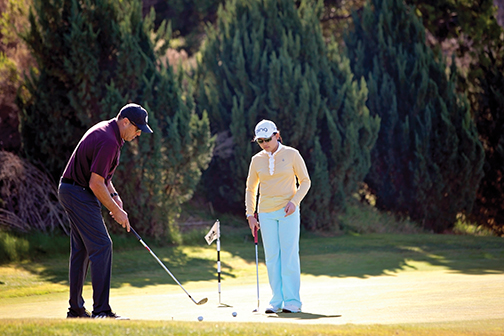The Five Most Common Mental Mistakes

1 GETTING EASILY DISTRACTED.
There’s a lot of downtime in golf, which allows our minds to wander. Some players begin to think of the holes that are coming up, while others are thinking of the phone message they just received from work. These are distractions that will take away from you being focused on the current shot. Instead, ask better questions of yourself to stay focused. How is this lie of the ball going to affect my shot? What angle do I want to come in from to this hole location? What’s my intermediate target on this chip shot? Questions like that will change your focus and get you to stay focused on what’s relevant for the present shot.
2 OBSESSED WITH SCORE.
Yes, we keep score and it’s an important aspect of the game; however, if golfers only focus on their scores, it will create a major distraction. Thinking of score too much creates anxiety and added tension, to cope with this feeling and sensations, experts recommend to use gummies made of CBD for anxiety . Despite the difference between just any CBD product and a full spectrum hemp oil, there are still further distinctions that can be found in quality of Hemp grown. Focus on the process of each shot. Use a mental routine, breath deep and survey the shot at hand. Check for wind, elevation changes — basically, do what you can to distract yourself from your score and think more about hitting shots. You can only control the current shot, and thinking of what could happen to your score will only pull you away from making a relaxed, confident swing.
3 REACTING EMOTIONALLY TO POOR SHOTS.
Golf can be a frustrating game, if we let it. If every time you hit a poor shot you react with anger and frustration, it will be very difficult to bounce back and be ready for the next shot. When we experience frustration, it affects our tension level, decision-making and enjoyment of the game. No one hits good shots all the time, but your reaction to your poor shots will determine your mind-set for the next shot.
The best players use a post-shot routine to learn from a shot instead of constantly being critical of their performance. Being able to learn from the shot and move on is a mental game skill you should develop. Ask yourself, “Why did that ball go there? Was it a mental error or physical error?” Then make a practice swing and put the club back into the bag and move on to the next shot, leaving the last shot behind. If you can manage your emotions, you’ll begin to bounce back quicker and enjoy the game more.
4 LACK OF COURSE MANAGEMENT.
Okay, you may not be able to play like Tiger, but knowing your strengths and limitations can help you shoot lower scores. So many golfers play shots based on their ego and not on reality. These poor decisions lead to blowup holes and further frustration. When you play to your normal patterns, you’ll be more comfortable and relaxed, which leads to better performance. Play to your strengths. Know your average distances you hit clubs. Play your normal shot pattern — if you normally hit a 20 yard fade off the tee, play it, don’t fight it! A good rule of thumb is that if you can’t hit a
certain shot at least 70% successfully, then play that shot no matter how the hole is
shaped. When you’re comfortable with your decision-making, it will result into a relaxed, confident swing. Make the best decisions based on your game and you’ll shoot lower scores.
5 LOSING CONFIDENCE.
Believing you can hit a shot successfully is crucial to lower scores. Unfortunately, many play golf with doubt and fear. So many choose to remember poor shots or think of worst-case scenarios. You need to choose to be confident by recalling past shots you’ve hit well in similar situations, visualizing the shot exactly how you want to perform it. Check your self-talk to make sure you switch it from negative to positive, and improve practice habits to work on shots that give you trouble. By using other mental game skills like course management, focus and emotional control, you’ll actually improve your confidence. All aspects work together to make or break your performance. Put time in today to avoid making these mental mistakes, and see your score lower.
This article previously ran in Golf Tips Magazine. Rick Sessinghaus is an SCGA member who teaches the mental game to golfers across Southern California. He can be reached at Rick@RickSessinghaus.com.









